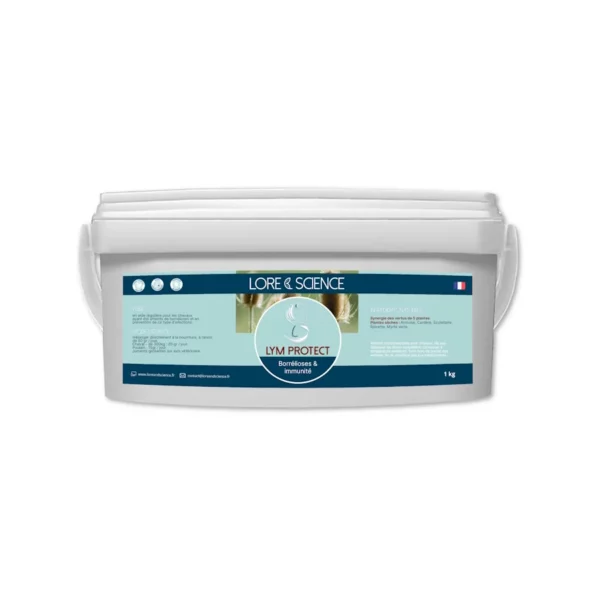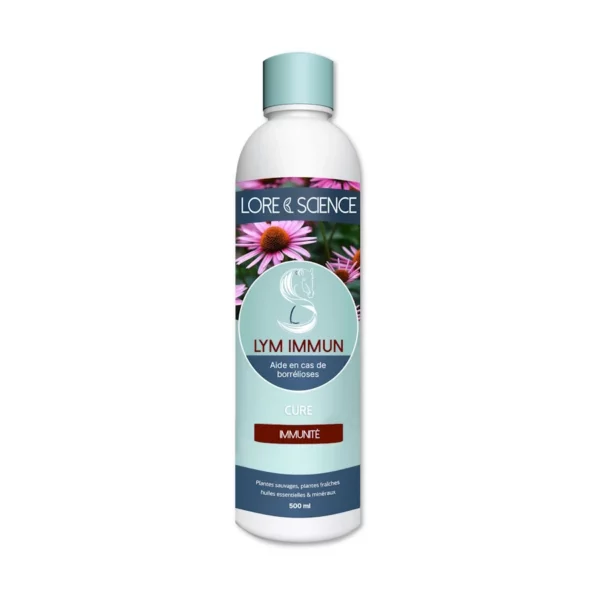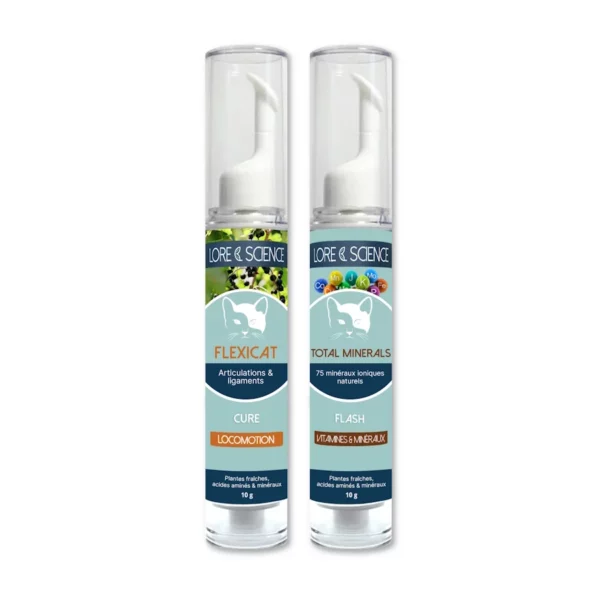Have you ever heard of borreliosis? These infections, the best known of which is Lyme disease, can affect dogs and horses as well as humans. They are caused by a bacterium called Borrelia burgdorferi which is transmitted by infected ticks. Borreliosis can be difficult to diagnose, as symptoms can vary considerably. Symptoms, diagnosis, treatment and prevention of borreliosis in dogs and horses, Lore & Science tells you all about it in this article.
Borreliosis: a variety of symptoms
In horses and dogs, symptoms of borreliosis may appear within a few weeks of exposure to the bacteria, but can also take several months to appear. They can also be intermittent, appearing and disappearing without warning. This, of course, complicates diagnosis. In fact, borreliosis is one of the so-called cold infections, as it does not necessarily trigger a fever. Nevertheless, here are a few symptoms that should alert you.
Symptoms of borreliosis in dogs 🐶
Dogs, bitches or puppies with Lyme disease or borreliosis-like infections may be lethargic and have low energy levels. They may have difficulty walking, jumping or climbing stairs. Other signs to watch out for include, but are not limited to, the following:
- Fever
- Loss of appetite
- Fatigue
- Joint pain
- Joint stiffness
- Muscle pain
- Swollen lymph nodes
- Neurological symptoms
Symptoms of borreliosis in horses 🐴
As with dogs, symptoms of borreliosis in horses, mares and foals can take several weeks to appear after exposure to the bacteria. Among them, lameness is common and can affect one or more limbs. Horses suffering from Lyme disease can also be highly sensitive to pressure, and more reactive to tactile stimuli. We have compiled a list of potential signals of borreliosis in equids:
- Fever
- Lameness
- Swollen joints
- Neurological symptoms
- Weight loss
- Fatigue
- Reduced appetite
- Respiratory symptoms
In all cases, if your horse or dog displays one or more of these symptoms, we recommend that you consult your veterinarian, who will be able to make an appropriate diagnosis.
Diagnosis of borreliosis
Diagnosing borreliosis in dogs and horses is often a challenge for veterinarians, as the clinical signs presented by infected animals can be non-specific and resemble those of other diseases. As a result, it's important to call on a qualified, experienced professional to diagnose this complex disease.
A blood test is commonly used to detect the presence of antibodies against the bacteria responsible for borreliosis. However, it can sometimes give falsely negative results if the dog or horse has recently been exposed to the bacteria. What's more, antibody levels can vary according to the stage of the disease, making diagnosis all the more difficult.
In some cases, the veterinarian may use imaging techniques, such as X-rays and ultrasound, to assess the extent of inflammation in the joints or muscles. These tests can also detect other abnormalities, such as fractures and tumors. However, as they are not specific to borreliosis, they can only be used to confirm the diagnosis.
Finally, it's important to note that early diagnosis of borreliosis is crucial to successful treatment. Therefore, if you notice any signs of the disease in your pet, don't hesitate to consult a veterinarian immediately to avoid any complications.
Treatment of borreliosis in dogs and horses
Treating borreliosis in dogs and horses is a complex process, and usually involves a combination of treatments. In general, veterinarians prescribe antibiotics to combat the bacterial infection. Doxycycline and amoxicillin are the antibiotics most commonly used to treat borreliosis, as they are effective in killing the bacteria responsible for the infection.
However, treatment of borreliosis can be a protracted process, as the infection can be deeply rooted in the animal's body. Consequently, treatment may last several weeks or even months, depending on the severity of the infection. Veterinarians often recommend regular check-ups to monitor the effectiveness of the treatment and ensure that the infection has been completely eliminated.
Antibiotics
In more severe cases, vets may also prescribe anti-inflammatory drugs to relieve symptoms. These drugs can help relieve pain in joints and muscles, improving the animal's comfort and speeding up the healing process.
It's important to note that antibiotics are not always 100% effective in eliminating infection. Sometimes, the infection may persist even after prolonged treatment, and some animals may require additional treatment or long-term monitoring to prevent relapse. Therefore, it's important to follow your veterinarian's recommendations to ensure a complete cure and minimize the risk of relapse.
Medicinal plants
The effectiveness of medicinal plants against borreliosis is also clinically proven. If your horse is affected, you can add Lym Immun (B), our 100% natural feed supplement recommended for the treatment of borreliosis, such as equine piroplasmosis, Lyme disease andequine ehrlichiosis.
We also recommend Lym Protect, a herbal synergy with anti-bacterial properties , comprising 5 essential medicinal plants to combat borreliosis-type infections. Like all our supplements, the plants in these products have been validated by scientific studies.
Prevention of borreliosis in dogs and horses
The best way to combat borreliosis is, of course, prevention. Since these diseases are transmitted by ticks, the best way to prevent them in animals is to reduce their exposure to these mites. There are several preventive measures you can take to help protect your dog or horse.
First of all, avoid as far as possible wooded or grassy areas where ticks are likely to be found. Not letting your dog or horse roam in these areas can greatly reduce its exposure to ticks. If you can't stay away from these areas, then it's a good idea to use tick repellents on your pet. These can take the form of collars or sprays to be applied to your horse or dog before outings.
Also, regularly inspect your dog or horse for ticks. If you find a tick on your pet, remove it quickly. It's advisable not to touch the tick with your bare hands, as this can increase the risk of transmitting the bacteria. Instead, use tick forceps or disposable gloves to remove the tick properly. If you can, store the tick in an airtight container.
Finally, it's important to keep a close eye on your dog or horse after it's been bitten by a tick. If you notice any symptoms of borreliosis, such as fever, muscle stiffness or joint pain, consult your veterinarian immediately. The sooner the disease is detected and treated, the greater the chances of your pet's recovery.
In short, by taking these preventive measures, you can help to significantly reduce the risk of borreliosis in your dog or horse. It's important to remember that prevention is the key to protecting your pet's health and ensuring its long-term well-being.
Questions about borreliosis-type infections in your pet? We'll answer them in comments ↓



















10 réactions sur "Borrelioses: everything you need to know about Lyme disease in dogs & horses"
Hello, my 9 year old dog had lyme disease. Among other things, this has given her kidney and intestinal inflammation. How can I reduce her inflammation? (She eats kidney paste, and takes Chloraminophene and proplan fortiflora as treatment).
Hello,
you can send a request for advice to our animal health expert at conseils@loreandscience.fr.
He'll get back to you with a protocol tailored to your dog's condition.
Hello, can lyme disease cause liver problems and insulin imbalance? My horse tested positive for lyme, but the vet refused to treat him, declaring laminitis' colic' muscle stiffness, for her it was sme, so he was put on medication, diet, and insulin doubled again for no reason. Hence the possibility of lyme, especially as the liver parameters are not good. Merci de votre réponse
Hello,
The toxins constantly released by infectious agents lodge in the intestine, liver and lymph. The liver has an immune function through its Kupferr cells, but also endocrine functions. It's easy to understand why hypertoxemia linked to cold infections degrades liver and digestive functions, and in turn metabolism.
In fact, the entire immune system is degraded by the toxin weapons produced by infectious agents.
Hello,
I just learned that my horse was positive for Theileriosis, I had my vet on the phone but no further explanation, appointment made for blood test, is it ok the ImmuB for Theileriosis?
Thank you very much
Hello, we recommend this supplement but not only, I invite you to send a message to our advisor to establish a suitable protocol → conseils@loreandscience.fr
Hello
I have a young mare who is 4 years old, bought in may 2022 at 2 years old.
In August 2022 she had an oesophageal blockage with her usual pellets. Esophageal stricture + loss of general condition + prickly coat: blood tests positive for Lyme and erlichiosis. Ronaxan treatment started, draining cures.
She has just had a relapse. Weight loss and fatigue (she was at work lightly). Slightly positive for Lyme and anemia.
I have a new treatment protocol: Ronaxan 3 weeks, vita C effect 15 days, carbo top 1 month, and Hematinic 1 syringe/10 days.
I'm advised to take pre-pro-post biotics.
What is your opinion? Where can I find them? Is it safe to combine all these products? As well as the Immun B cure?
Thank you
Hello karine, Borreliosis-type diseases (in human medicine, the exact term is Lyme disease and its infectious cofactors) give rise to a multitude of different symptoms and health problems. These include joint and muscle disorders, digestive problems and, in the case of neuroborreliosis, major neurological problems.
To be more precise in your mare's case, it is of course essential to support her intestinal flora during treatment. It will then be necessary to detoxify her body of the bacterial toxins released by the bacteria. If the liver is under-functioning due to hyper-toxemia, it will no longer be able to fulfill its immune role (Kupffer cells), nor its hormonal function.
Of course, it will also be essential to boost the liver's natural defenses.
I remain at your disposal conseils@loreandscience.fr for further information.
Lionel
What is the difference between immune b and Lyme protect? In which cases is one or the other recommended?
Hello,
Immun B is a very active product that is administered over 25 days. The Lyme Protect product is best used for prevention or maintenance following the initial protocol containing Immun B.